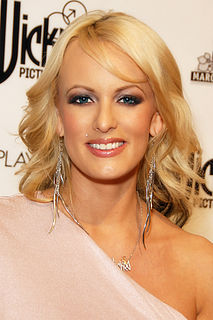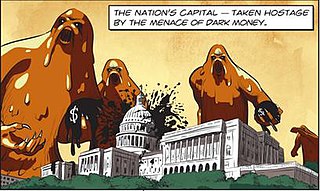 W
WThe Bipartisan Campaign Reform Act of 2001 is a United States federal law that amended the Federal Election Campaign Act of 1971, which regulates the financing of political campaigns. Its chief sponsors were senators Russ Feingold (D-WI) and John McCain (R-AZ). The law became effective on 6 November 2002, and the new legal limits became effective on January 1, 2003.
 W
WOn January 12, 2018, The Wall Street Journal reported that in October 2016, just before the 2016 United States presidential election, then presidential candidate Donald Trump's lawyer, Michael Cohen, arranged payment of $130,000 to adult film actress Stormy Daniels to stop her disclosing an affair she alleged they had in 2006. Daniels had signed a non-disclosure agreement (NDA). At first, Cohen denied Trump had the alleged affair and sought to suppress the allegation based on the NDA, but a month later publicly acknowledged making the payment.
 W
WIn the politics of the United States, dark money refers to political spending by nonprofit organizations—for example, 501(c)(4) 501(c)(5) (unions) and 501(c)(6) groups—that are not required to disclose their donors. Such organizations can receive unlimited donations from corporations, individuals and unions. In this way, their donors can spend funds to influence elections, without voters knowing where the money came from. Dark money first entered politics with Buckley v. Valeo (1976) when the United States Supreme Court laid out Eight Magic Words that define the difference between electioneering and issue advocacy.
 W
WThe Joe Biden administration pledged to pass government ethics reform. The Biden administration also pledged to pass legislation and enforce policies to enforce electoral reform, in response to the influence of special interests and gerrymandering in elections.
 W
WThe Federal Corrupt Practices Act, also known as the Publicity Act, was a federal law of the United States that was enacted in 1910 and amended in 1911 and 1925. It remained the nation's primary law regulating campaign finance in federal elections until the passage of the Federal Election Campaign Act in 1971. The Act was signed by President William Howard Taft on June 25, 1910.
 W
WThe Federal Election Campaign Act of 1971 is the primary United States federal law regulating political campaign fundraising and spending. The law originally focused on increased disclosure of contributions for federal political campaigns. The Act was signed into law by President Richard Nixon on February 7, 1972.
 W
WThe Honest Ads Act is a bill in the United States Senate legislative body to promote regulation of campaign advertisements online by online companies such as Facebook and Google. The act is a bipartisan bill sponsored by Senators Amy Klobuchar (D), Mark Warner (D), and John McCain (R). The bill was proposed on October 19, 2017, as a response to investigation regarding Russia purchasing political ads during the United States 2016 presidential election. There is also a companion version to this bill in the House of Representatives, HR 4077, sponsored by Representative Derek Kilmer.
 W
WMoneyocracy is a 2012 documentary film about Citizens United v. Federal Election Commission, 558 U.S. 310 (2010),which was a landmark United States Supreme Court case in which the Court held that the First Amendment prohibited the government from restricting independent political expenditures by corporations and unions. The film explores how the Citizens United v. Federal Election Commission decision has dramatically changed the U.S Campaign Finance Laws and lead to the most expensive Elections in the United States. The film describes the systemic corruption of the United States democracy and the consequences of that systemic corruption on the U.S democracy and the electorate.
 W
WShadow campaigns refers to spending meant to influence political outcomes where the source of the money is not publicly disclosed or is difficult to trace. United States campaign finance law has been regulated by the Federal Election Commission since its creation in the wake of the Watergate Scandal in 1975, and in the years following Citizens United v. FEC, there has been a rise in outside special interest groups spending money on political campaigns in the United States. Dark money leaves voters uninformed about important political information and it can obscure potential conflicts of interest for judges and legislators alike.
 W
WThe Tillman Act of 1907 was the first campaign finance law in the United States. The Act prohibited monetary contributions to federal candidates by corporations and nationally chartered (interstate) banks.
 W
WVeterans for a Strong America (VSA) is a conservative political action committee that describes itself as a "non-partisan action organization dedicated to educating the public, members of Congress and the Executive Branch about a strong national defense, robust foreign policy and building a military that is second to none." The group was founded by Joel Arends of Sioux Falls, South Dakota, who is also the chairman and sole staffer of the group. Arends is an attorney and political consultant in Sioux Falls, where the organization is based. He previously worked as the South Dakota field director for the 2000 Bush-Cheney campaign and as a consultant to the Americans for Prosperity group, affiliated with the Koch brothers. VSA has been described as a dark money group.